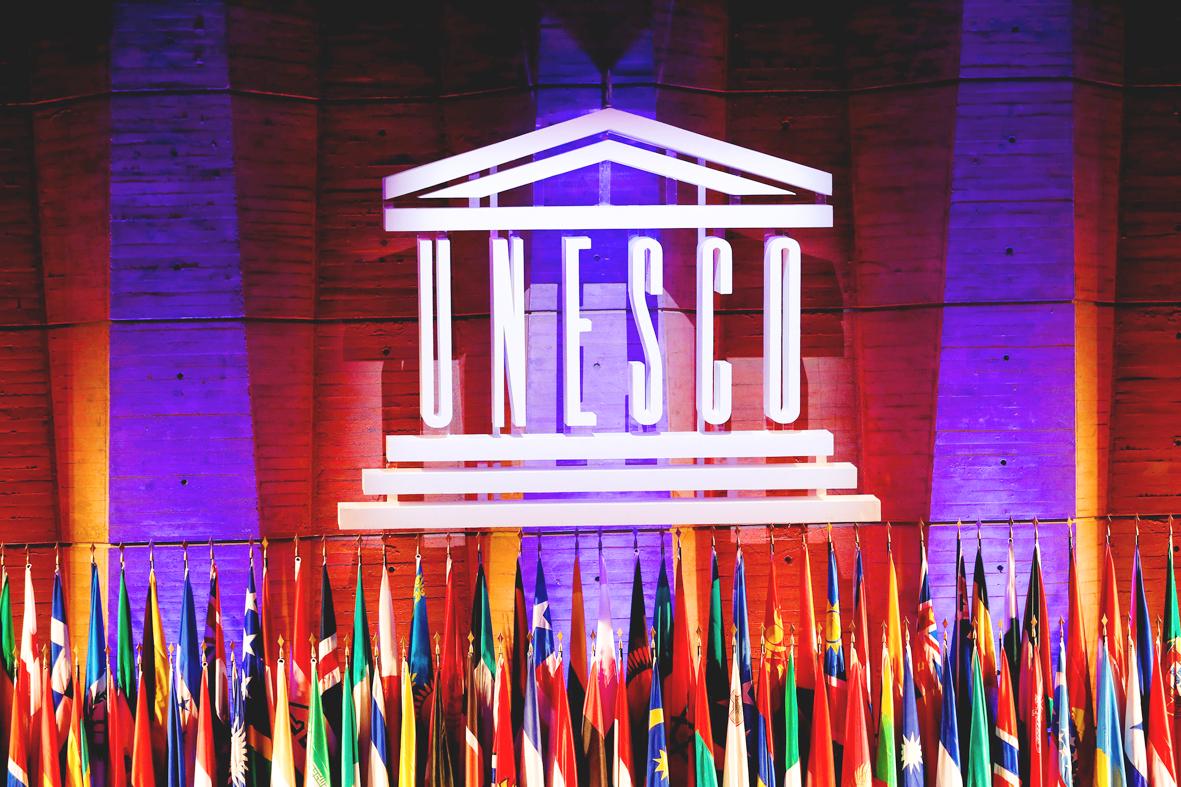Taiwanese are to be excluded from participating in all UNESCO-affiliated events, the International Centre for Theoretical Physics (ICTP) has confirmed, sources said yesterday.
The confirmation came after Taiwanese researchers — some at institutions abroad — had their applications to join a conference last month rejected.
The ICTP — an organization run jointly by the Italian government and UNESCO — is holding a virtual conference on quantitative biology, which began on Monday last week and runs until Friday next week.

Photo: Reuters
Registration for the conference was open until Nov. 15, but Taiwanese at various institutions around the world posted on Twitter and elsewhere over the past week that their applications had been rejected.
“Founded in 1964 by the late Nobel Laureate Abdus Salam, ICTP seeks to accomplish its mandate by providing scientists from developing countries with the continuing education and skills that they need to enjoy long and productive careers,” the organization’s Web site says.
One Twitter user wrote that the exclusion of Taiwanese was ironic, given that conference organizers were attempting to appear inclusive with the message “Female scientists are encouraged to apply” written on the bottom of a notice for the conference posted on the ICTP Web site.
“My advice for future @ictpnews @UNESCO event: Add an additional line ‘Taiwanese scientist will not be accepted’... so ppl won’t waste time applying for an opportunity they will be rejected from based on their country of origin,” Yeh Chih-fu (葉治甫), a Taiwanese doctoral student at Stanford University, wrote on Twitter on Wednesday.
Alexander Sullivan, fellow at the Washington-based Center for a New American Security think tank and a Georgetown University doctoral student, on Twitter criticized Beijing’s influence over UNESCO and its affiliated organizations.
“China has grown quite powerful within UNESCO, especially post US withdrawal under Trump. Shameful to see UNESCO further constricting not just Taiwan as a government, but individual scientists, as part of the PRC’s political agenda,” he wrote on Twitter on Thursday, referring to the People’s Republic of China.
Citing another researcher, Sullivan wrote that Chinese President Xi Jinping (習近平) has also been influencing archeology through UNESCO “as a way to tell the whole world a good story of Chinese history.”
Meanwhile, the US-China Economic and Security Review Commission on Tuesday published its annual report, whose Chapter 5 outlined concerns about Chinese encroachment on Taiwan and laid out recommendations for US action.
The commission recommended that the US secretary of state report on actions planned and taken by the US government to counter Beijing’s isolation of Taiwan, and to “strengthen support for Taiwan’s engagement with the international community, including [outlining] actions the administration will take should Beijing increase its coercion against Taiwan.”

Right-wing political scientist Laura Fernandez on Sunday won Costa Rica’s presidential election by a landslide, after promising to crack down on rising violence linked to the cocaine trade. Fernandez’s nearest rival, economist Alvaro Ramos, conceded defeat as results showed the ruling party far exceeding the threshold of 40 percent needed to avoid a runoff. With 94 percent of polling stations counted, the political heir of outgoing Costa Rican President Rodrigo Chaves had captured 48.3 percent of the vote compared with Ramos’ 33.4 percent, the Supreme Electoral Tribunal said. As soon as the first results were announced, members of Fernandez’s Sovereign People’s Party

MORE RESPONSIBILITY: Draftees would be expected to fight alongside professional soldiers, likely requiring the transformation of some training brigades into combat units The armed forces are to start incorporating new conscripts into combined arms brigades this year to enhance combat readiness, the Executive Yuan’s latest policy report said. The new policy would affect Taiwanese men entering the military for their compulsory service, which was extended to one year under reforms by then-president Tsai Ing-wen (蔡英文) in 2022. The conscripts would be trained to operate machine guns, uncrewed aerial vehicles, anti-tank guided missile launchers and Stinger air defense systems, the report said, adding that the basic training would be lengthened to eight weeks. After basic training, conscripts would be sorted into infantry battalions that would take

GROWING AMBITIONS: The scale and tempo of the operations show that the Strait has become the core theater for China to expand its security interests, the report said Chinese military aircraft incursions around Taiwan have surged nearly 15-fold over the past five years, according to a report released yesterday by the Democratic Progressive Party’s (DPP) Department of China Affairs. Sorties in the Taiwan Strait were previously irregular, totaling 380 in 2020, but have since evolved into routine operations, the report showed. “This demonstrates that the Taiwan Strait has become both the starting point and testing ground for Beijing’s expansionist ambitions,” it said. Driven by military expansionism, China is systematically pursuing actions aimed at altering the regional “status quo,” the department said, adding that Taiwan represents the most critical link in China’s

EMERGING FIELDS: The Chinese president said that the two countries would explore cooperation in green technology, the digital economy and artificial intelligence Chinese President Xi Jinping (習近平) yesterday called for an “equal and orderly multipolar world” in the face of “unilateral bullying,” in an apparent jab at the US. Xi was speaking during talks in Beijing with Uruguayan President Yamandu Orsi, the first South American leader to visit China since US special forces captured then-Venezuelan president Nicolas Maduro last month — an operation that Beijing condemned as a violation of sovereignty. Orsi follows a slew of leaders to have visited China seeking to boost ties with the world’s second-largest economy to hedge against US President Donald Trump’s increasingly unpredictable administration. “The international situation is fraught